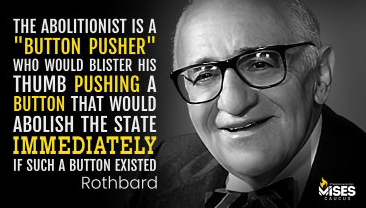Before I address weightier arguments, let me dismiss the naive conservative argument that, since we have the right to exclude strangers from our homes and property, we have the right to exclude foreigners from our "country". This is fallacious, since it equates private property with fief (government claimed jurisdictional territory). The former rests on the Entitlement Theory of Justice, while the latter rests on conquest and plunder, which clearly violates entitlement theory. The bottom line is: If you believe that statist fief is legitimate, then you deny the legitimacy of private property; you are saying that the government owns all the land. You may be a communist. We anarcho-capitalists think that Private property borders are legitimate but fief borders are not.
Most anarcho-capitalists I know are for open borders. Paleo-libertarian closed border proponents are kind of an embarrassment - claiming to oppose the State in principle but wanting to use centralized State power to regulate immigration levels. There are two parts to the disagreement, one strategic and one theoretical. Stephan Kinsella and Hans-Hermann Hoppe are proponents of the closed border position.
I’ve argued that Hoppe has a point that in today’s democratic system, immigration, whatever the state policy is, some rights are violated: either those of the would-be host/employer (forced exclusion) or those of citizens (forced integration). - Stephan Kinsella [1]
Forced exclusion, by border Nazis with guns and such, is clear. On the other hand, the term “forced integration” seems contrived and misleading. No one is forced by the State to interact with immigrants. A more accurate term would be government subsidized integration. Or perhaps: subsidized inclusion.
Kinsella’s rather handwaving definition of forced integration in appendix I is, “because of state roads, anti-discrimination law, welfare, [and] voting”. These are all subsidies (or voting for such) rather than direct force, except for anti-discrimination laws. But anti-freedom of association laws (eschew statist terminology) are a different issue, primarily about race and ethnicity. Anti Freedom of Association policies would be a problem regardless of what statist immigration policy is, so it seems illegitimate to package these issues together (Hoppe correctly warns us about this error with respect to packaging immigration with welfare policy.[2]) Thus, a more accurate rendering of Hoppe’s point is:
Government policy necessarily violates rights by forced exclusion and subsidized inclusion.
Anarcho-capitalists agree. In the following, I will use a shorthand. “Ancaps” will refer to open border anarcho-capitalists, and “paleos” (paleo-libertarians) will refer to closed border anarcho-capitalists. It is important to note that we agree on the ideal goal end-state - a stateless society wherein we are free to participate in stateless capitalism.
The Strategic Disagreement
Ancaps and paleos disagree on the transitional strategic question:How should we treat the State and its de facto property while it still exists?
Ancaps and paleos agree the the State is illegitimate, a criminal organization. One way to frame the question is by asking what would/should be done if it were a private criminal organization, i.e. one without flags, badges, or mystic masks of moral legitimacy.
The two general answers are:
Ancap: Treat the State as an ongoing criminal enterprise, and its “property” as illegitimate, unowned per moral law, and open to homesteading. Do you hate the State? Paleo: Treat the State as the (taxpaying) people’s corporation, with rulers deciding how to use and dispose of government property. When and if the State disbands, former taxpayers should receive shares of government’s decreed property (or proceeds therefrom) except in the case of government plunder that has a clear rightful owner.
To ancap ears, the paleo position sounds like aiding and abetting the evil State, and not resisting rulership too much, since they expect to receive the loot when/if the State dies. There is a clear conflict of interest.
The libertarian sees the State as a giant gang of organized criminals, who live off the theft called “taxation” and use the proceeds to kill, enslave, and generally push people around. Therefore, any property in the hands of the State is in the hands of thieves, and should be liberated as quickly as possible. Any person or group who liberates such property, who confiscates or appropriates it from the State, is performing a virtuous act and a signal service to the cause of liberty. - Murray Rothbard [3]
Ancaps take this Rothbardian position that all State-plundered non-returnable loot is fair game (except for the thieves) to homestead. Someone who frees resources from the evil State and returns them to voluntary society is a hero!
The Theoretical Disagreement
The root theoretical difference between ancaps and paleos seems to be in our views of public easements, and the notion of public property in general.
Some definitions:
property - a resource along with a set of norms concerning its use and disposition
private property - property with particular identifiable owners
public property - property owned by people in general
government property - property claimed by a State; not to be confused with public property
fief - the jurisdictional territory claimed by a State; not property at all
The most common property norm types are:
Moral Property - (aka natural law property) grounded on some moral system of distributive justice
Decreed Property - granted by ruler (or divine) fiat
De Facto Property - grounded on current use and control, without necessarily any moral or decreed rationale
With these definitions one can easily answer Stephan Kinsella’s question:
Suppose I own a private elementary school, but I decide to close it down. The state offers to buy it from me for $1M, so I sell it to them. The state uses the facility as a local public elementary school. Would you describe the property as unowned? [4]
Yes, definitely. It is unowned by the criteria that counts - moral property norms. It is decreed property. It becomes unowned (by natural law) the instant the State bought it with stolen money. The school lost its status as moral property and became ill-gotten stolen goods - illegitimate decreed “property.”

Why would you treat it as legitimate (moral) property? The ancap Rothbardian “button pusher” mainly cares about devolving the illegitimate wealth to Society as soon as possible. Paleos seem fine with rulers having control over roads and schools indefinitely, with their Soviet style predictions and fatally conceited planning attempts to mimic migration levels in a freed market. (Do you notice how paleos grossly overestimate the number of taxpayers and property owners who want to restrict freedom of travel for foreigners?) Ancaps don’t oppose any destatization plan, but paleos seem to have no strategy to get rid of government control, but instead seem quite happy to lobby rulers for forced exclusion policies indefinitely. Paleos are definitely not button-pushers!
I think that the main theoretical difference between ancaps and paleos is on the question of the legitimacy of public property. (Recall, I mean property owned by the general public here, not property controlled by government allegedly for the people.)
Everyone agrees that if an individual goes into the wilderness and works some unowned land sufficiently, then that land becomes his. But what if many people use the land over a long period of time, none doing sufficient “mixing of labor” to acquire private ownership but cumulatively doing significant work. Examples: The Oregon Trail. Or going way back, the Silk Road. The open seas. In this case, one might assert that the land, the Oregon Trail, is a public easement, a type of public property, and no one is justified in blocking it or demanding tolls. Such people are called bandits on trails and pirates on the seas. My suggested extension of individual Lockean homesteading is:
The general public can homestead unowned resources by collectively doing sufficient “mixing of labor” on those resources.
Thus, by this criteria the ranchers in the Wyoming “Johnson County War” were violating the public easement of the westward trail when they forcibly prevented immigrants from passing through or homesteading. Similarly, bandits on the Silk Road could not plausibly say “Well. you’re passing through our land, so we’re merely collecting rent.” If there is a long history of unrestricted public use, then it is almost certainly legitimately homesteaded by the public.
Hoppe considers local easements and correctly notes that any privatization or improvements which might be private must respect existing easement property rights.
How is it possible that formerly unowned common streets can be privatized without thereby generating conflict with others? The short answer is that this can be done provided only that the appropriation of the street does not infringe on the previously established rights — the easements — of private-property owners to use such streets. - Hans-Hermann Hoppe [5]
Hoppe gets it right as far as he goes, but he fails to consider long-distance roads and the implications for general public ownership. Can a homesteader block the Oregon Trail? Or has the general traveling public established ownership through original acquisition principles?
Freedom of travel is necessary for a productive society. Having plenty of long distance trading routes established by public easements is conducive to prosperity and a wide division of labor. A society with exclusively private property suffers from possible surround and starve problems.
In a world where everything is privately owned, we must abide, wherever we go, by the rules laid down by the owners. Rich envisions a society in which no one is allowed access to the means of cooperation with others unless he submits to a multitude of restrictions: bonding, disarmament, full disclosure of finances, and so forth. Those who do not comply with these rules will find themselves cut off from food, drink, communication, transportation, even the use of restroom facilities. - Roderick Long [6]Public easements and the resulting opportunity to travel and trade were essential to the development of commerce and capitalism. Pluralism in property norms, with a diverse mixture of private property and public property (but not decreed property!) is amazingly beneficial - perhaps a necessary condition for truly free markets.
I envision a world of many individual private spaces, linked by a framework of public spaces. The existence of such a framework may even be a prerequisite for complete control over one’s own private space. - Roderick Long [7]
But what about bums in the public library? By applying our two strategies, the ancap and the paleo one, the solutions are respectively:
Ancap: The library is illegitimate decreed property. Anyone may homestead it, even stinking bums. Let statist dupes suffer the consequences of their collectivism and smell the vomit. Maybe the bum will help motivate poor deluded statists to privatize it. Or just abandon the whole brick and mortar library idea. We have the internet now; dead tree books are obsolete. Paleo: The library is taxpayer (government shareholder) property. We should use compulsory government to prevent people we don’t like from using it. Pay your property taxes and someday maybe a share of the library will devolve to you, citizen!
Notes
-
Stephan Kinsella, On “Unowned” State Property, Legal Positivism, Ownership vs. Possession, Immigration, Public Roads, and the Bum in the Library
“It would also be wrongheaded to attack the above case for free immigration by pointing out that because of the existence of a welfare state, immigration has become to a significant extent the immigration of welfare-bums, who, even if the United States, for instance, is below her optimal population point, do not increase but rather decrease average living standards. For this is not an argument against immigration but against the welfare state. To be sure, the welfare state should be destroyed, root and branch. However, in any case the problems of immigration and welfare are analytically distinct problems, and they must be treated accordingly.” - Hans-Hermann Hoppe, On Free Immigration and Forced Integration
Murray Rothbard, Confiscation and the Homestead Principle
Stephan Kinsella, ibid
Hans-Hermann Hoppe, Of Common, Public, and Private Property and the Rationale for Total Privatization
Roderick Long, In Defense of Public Space
Roderick Long, ibid
Also see: Roderick Long, A Plea for Public Property
